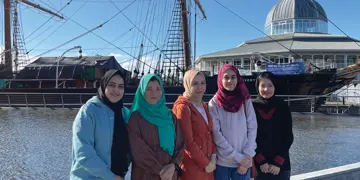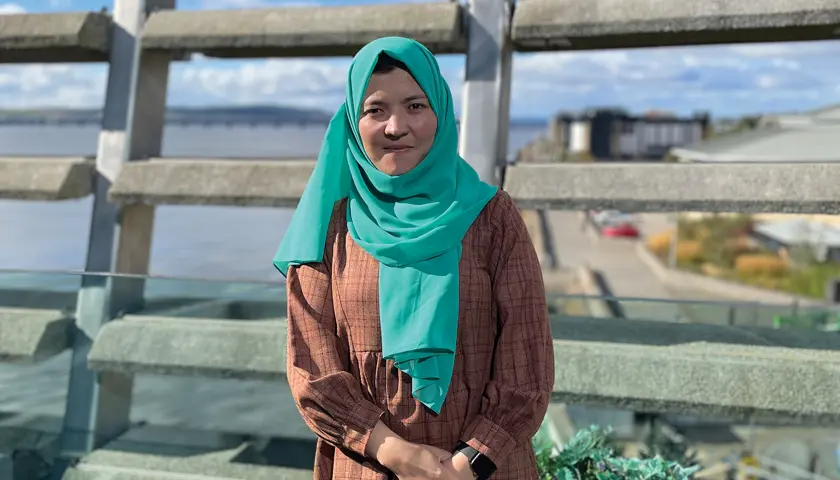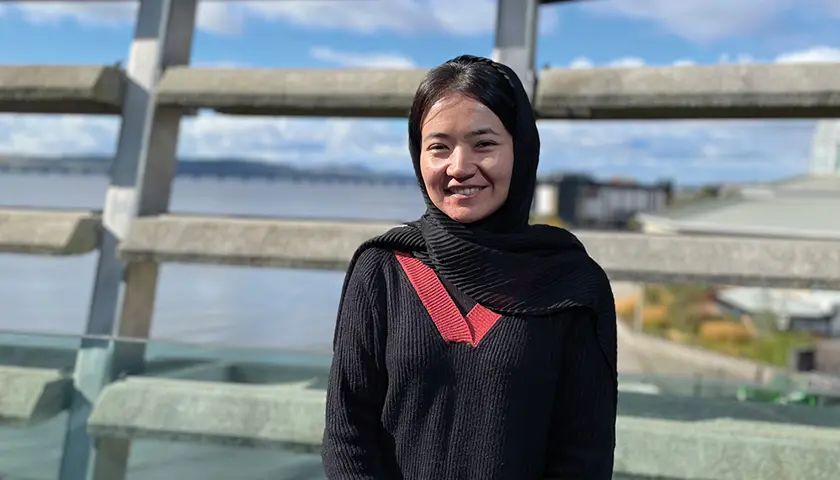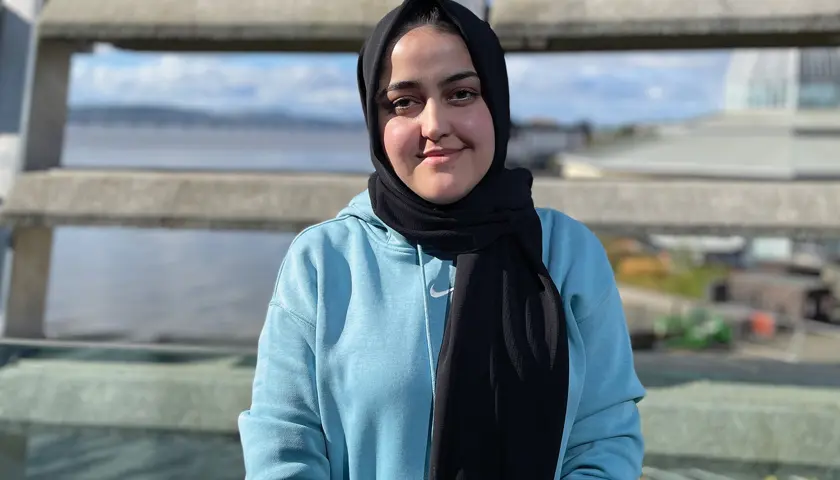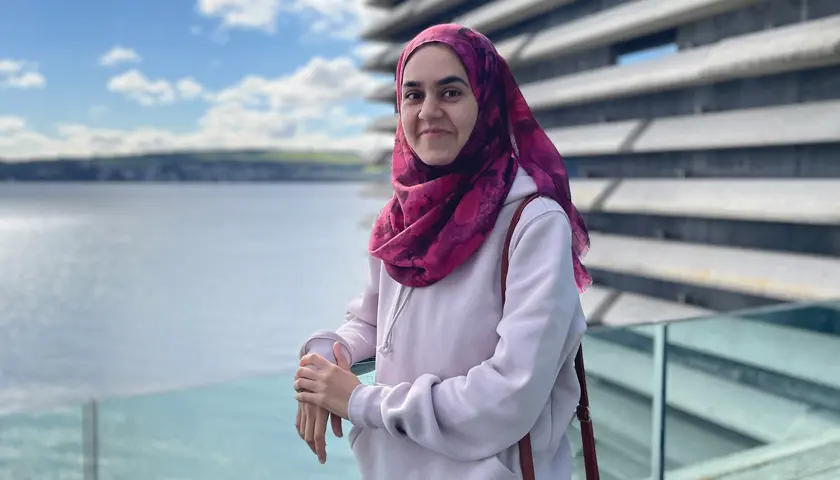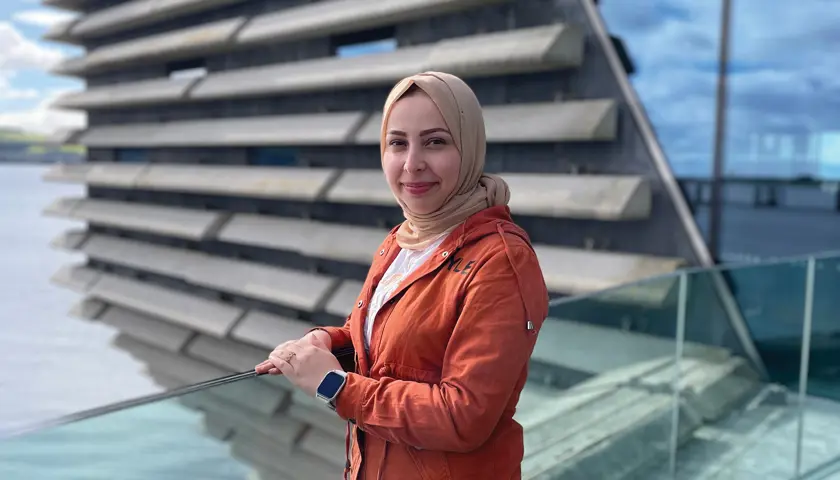Hopes restored: from Kabul to Dundee
Hopes restored: from Kabul to Dundee
When the Taliban banned women from higher education, female medical students in Afghanistan lost their futures overnight. But a group have made it to Scotland where, despite having to start all over again, they are determined to succeed
‘I was at the final exams of my eighth semester. We had two more to complete – medicine and pharmacology. It was the night before my medical exam we got the news there was no university tomorrow because there was a temporary ban for women. The exams were cancelled. At first, we didn’t know how to react to the news – we were tense and stressed about the exam, so in a way we were happy [that it was cancelled] but we didn’t understand the whole scenario and what was coming. In time, we realised it wasn’t just one day, it wasn’t a holiday, it was a ban. And it affected all women in universities in Afghanistan.’
This is 23-year-old Bibi Hajera Safi. The events she is describing took place three years ago – since then, her male medical student peers have finished their degrees and are working as doctors.
She, on the other hand, has at least six years to go until she gets to that point – and she is one of the ‘lucky’ ones. Thanks to the charity the Linda Norgrove Foundation, she has just moved to Scotland with the aim of completing a medical degree and becoming a doctor, like her male classmates.
I really wanted to become a doctor and help women like my mother
Khatera Amin
She is one of 19 students whose studies were interrupted thanks to the Taliban’s decision to ban women from attending university who are now attending Scottish medical schools, supported by the charity. But it’s a huge commitment. They have had to leave their homes and their families for six years – if they were to go back while they are students, it’s unlikely they would be able to leave again. And, possibly the most galling of all, although they were a whisker away from qualifying in their home country, they now have to start all over again with an access-to-medicine course, followed by the full five-year degree programme.
‘It reminds me of that song – I don’t know if you’ve heard it – going Back to Black [referring to an Amy Winehouse track],’ she says. ‘It’s not going back to black, but to a new beginning.’
This conversation is taking place in the Tatha Café in Dundee’s V&A Museum, a striking and unusual building on the revitalised waterfront, situated next to RRS (Royal Research Ship) Discovery. Made in Dundee, this impressive vessel undertook a hazardous journey to the Antarctic in 1901 carrying Captain (Robert Falcon) Scott and Ernest Shackleton.
‘Go and study’
Bibi Hajera Safi, and her four colleagues, Soraya Ghaznawi, Arifa Wahdat, Khatera Amin, and Muzhda Iqbal (pictured, top), have been in Scotland for just three weeks when we meet, and are looking forward to starting lectures the following Monday. Getting here had been tough. First, they had to apply to be considered for the places, then, having made it over that hurdle, they had to wait while the charity jumped through regulatory hoops to make it possible. Then – with very short notice – they made the journey to Pakistan, where they then found out they had to pass an additional language test to be admitted to the Scottish medical schools.
In the three years since their studies were interrupted, two of the five have married, and had to leave their husbands behind as well as their families. Khatera Amin, whose wedding took place a matter of weeks ago, says her new husband was supportive of the decision.
‘It was 20 days after my marriage when I went to Pakistan,’ she says. ‘My husband has been so supportive. He is really happy I got this opportunity and said I must achieve my goal because I’d tried to do that my whole life. I really miss him, but he said, “It doesn’t matter; I’m always with you – just go and study”.’
She has wanted to be a doctor almost as long as she can remember. When she was a child, her mother suffered severe illness, she says, but there were no doctors in the northern province of Afghanistan where the family was living at the time.
‘We had to sell our house and get her out of Afghanistan to Pakistan so that she could be treated. Because I was a child, I could see that my mother was suffering and that there were no qualified doctors. I really wanted to become a doctor and help women like my mother.’
Supported by the Linda Norgrove Foundation, she moved to Kabul and in 2019 started the first year of her clinical studies. She remembers clearly the time when the Taliban announced that women could no longer attend university. ‘I was so close to graduation. It was so shocking, so heartbreaking. I cried the whole night. I thought I had lost my hope.’
Having successfully made it to Scotland to continue her studies – or, more accurately, to restart them – she sounds happy. ‘I feel I’m alive again,’ she says simply. ‘I have a new journey, I can start again from the beginning, it’s like starting a new life. I’m happy now and so excited to start my studies again, because it’s been three years and I sometimes thought there would be no chance for us to start again.’
Follow your dreams
Arifa Wahdat had already taken the big step of leaving her family – her father is a farmer and mother a housewife – to study in a province far from home in Afghanistan. Even that wasn’t easy. ‘My older brother always helped me and my sister to continue in our education.
He spoke to my parents and told them I had my own dreams and should be able to continue my education. But it is really hard. When I was in Pakistan I felt a lot of stress about the journey – I was thinking that when I go to a different country I will face a lot of challenges apart from my family, and I don’t have any family or friends in Scotland.
‘I really miss my parents and now I’ve abandoned my family and friends to come here, but I know I will find new friends and they can help me pass this difficult situation.’
It’s a similar story for Muzhda Iqbal, whose loved ones – including her husband of six months – have also encouraged her to pursue her goals. ‘They are really proud and happy that I’ve come [to Scotland] but it’s natural that we miss each member of our family,’ she says.
I’ve abandoned my family and friends to come here, but I know I will find new friends
Arifa Wahdat
She was in her ninth semester when the ban on women attending universities came into force – with just three exams to pass before moving on to the practical year (a requirement of graduation). ‘I was so near to achieving my goals and completing my education – just three exams and I could be a professional doctor in Afghanistan. It was very hard to be told we wouldn’t be able to achieve our goals.’
Having been selected to come to Scotland, she describes herself as ‘the luckiest girl’. And her goals are pretty specific. As a child, she had witnessed a situation where an aunt died because of complications in pregnancy because her family would not allow her to see a male doctor.
‘She died due to the lack of a female doctor and that made me stronger in my decision to be a doctor,’ she says. ‘When you have a special passion for something you follow your passion, and for me, the greatest thing a person can do is save the lives of others.’
She wants to follow a career in gynaecology, she says, focusing on developing countries, eventually building a private hospital to diagnose and treat poor people and provide free training for girls. It’s also her dream to be part of the Linda Norgrove Foundation. ‘It’s played a critical role in my life and the life of many others. I’m pretty sure that, when I graduate, I’ll achieve all the goals.’
Family tragedy
Soraya Ghaznawi is also keenly aware of the need for more doctors in the developing world, having also suffered a family tragedy. Her brother had fallen from a roof and bled severely. ‘We lived in a village in Ghazni Province.
'There was no medical facility there and my parents couldn’t afford to take him to a hospital in the centre of Ghazni or Kabul, so my brother unfortunately died. This had an effect on my whole family, and when they told me about it, I thought I should become a doctor and help people in rural parts of our country.’
It took around three years of work and campaigning for the Linda Norgrove Foundation to be able to bring the students to Scotland, and even until a few months ago, it didn’t look possible.
In February, the Scottish Government confirmed student funding regulations could be amended so the women could be treated as home students, meaning they were eligible for free tuition (in Scotland).
It has, the charity says, been a great effort of cooperation between the Scottish and UK Governments. The Foundation has paid all the costs of getting the students to Scotland and establishing them.
‘We’re all delighted to have finally succeeded after so much frustration,’ charity founder John Norgrove said as the students arrived. ‘Finally, these incredibly talented young women get their future back with the opportunity of a tremendous education and career. The alternative for them in Afghanistan wasn’t good.’
A lot of girls in Afghanistan are still waiting for that chance, but we have the opportunity
Bibi Hajera Safi
Even if the next six years go without a hitch, most of these women will be in their early 30s before they graduate and achieve their dream of being doctors. But they say that’s okay. ‘When you choose medicine you don’t think about your age,’ says Bibi Hajera Safi. ‘Because your whole life is dedicated to medicine.
‘It’s a tremendous opportunity that we’ve got. A lot of girls in Afghanistan are still waiting for that chance, but we have the opportunity. Women are about strength. We don’t fear starting again from zero.’
(Photographs by Jennifer Trueland)
The Linda Norgrove Foundation
The Linda Norgrove Foundation was founded in memory of an aid worker who dedicated her working life to improving the lives of others, particularly women and girls in Afghanistan.
She was kidnapped in 2010, then died in an attempted rescue by US forces. Her parents, John and Lorna, set up the foundation to continue her work.
The charity develops and supports programmes with a special emphasis on education and incomes for women. This includes providing scholarships for women studying to be doctors, midwives, and dentists. At the time that higher education for women was suspended in Afghanistan, the foundation was sponsoring 137 women studying medicine, midwifery and nursing.


